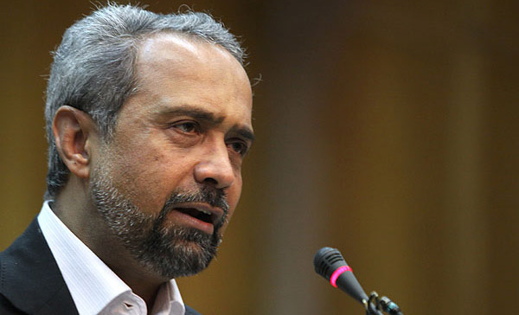President Hassan Rouhani’s chief of staff Mohammad Nahavandian appeared on a TV talk show late Wednesday to answer a wide range of questions, primarily on President Rouhani’s Azerbaijan visit, regional cooperation and how Iran is faring in the face of sanctions. The following is a partial translation of his comments filed by the Young Journalists Club news agency:
On what stands out about the Baku visit
During the visit, agreements which had been in the making for months were finalized. Also, negotiations were held on banking cooperation and on megaprojects which, among other things, will eventually link the two countries’ railway networks and open a new transit corridor.
Other areas of cooperation discussed were information technology, renewable energies, the environment, water resources, postal services, trade and investment, and energy.
On cooperation with neighboring countries
Transparent cooperation with neighboring countries is a major requirement for the active presence on the international stage, with Iraq being a case in point. Iran’s positive role in Iraq helped save its neighbor to the west from a serious threat like IS.
In Afghanistan, too, Iran’s support for a smooth transition of power was instrumental in foiling plots to re-plunge the country into chaos and turn it into a hotbed of terrorism.
Contacts with countries in the Persian Gulf, including Tehran visits by the Omani Sultan and the Kuwaiti Emir, and the deal Iran has just signed with Russia show that Tehran has opted for interaction as it walks down the path of progress.
On Iran’s regional outlook
Iran’s growth policies do not pit it against other nations. Our interests are not supposed to come at the cost of other countries’ interests. In pursuing a regional growth outlook, Iran takes account of the interests of its neighbors too.
In light of the fact that Azerbaijan plays an important role in global energy markets, the stage is set for Iranian businesses to invest in Azerbaijan’s development projects.
Another question that came up for discussion at talks among officials during the visit was medical tourism. Given that a large number of Azeri visitors come to Iran either for pilgrimage or for medical treatment, officials decided to establish direct flights between Baku and the pilgrimage city of Mashhad [in northeastern Iran] and build more hotels there.
On transportation as a government priority
Establishing a rail link with neighbors to the north is being given a lot of consideration. During the visit, the project to link Iran’s Astara to Azerbaijan Republic through railway was discussed. It would eventually connect Iran’s railway to Georgia and on to Europe. […] The closer our transport ties with the Central Asian countries, the better our export potential.
On impossibility of the efficacy of the economic embargo
If we manage to convince our neighbors that our economic growth will serve their interests too, they will pay no heed to calls by trans-regional powers to put economic pressure on Iran. The experience of recent years shows that a large economy like Iran cannot be crippled by economic embargo; sanctions do cause certain problems, though.
Iran is determined to overcome the economic problems it has been facing of late. Inflation is now below 20 percent and the country is out of recession. Signs of recovery are in evidence in different sectors.
On sanctions
It’s not that Iran’s economy cannot wait to see the sanctions lifted. Besides, thanks to the improvement of relations with neighboring countries, new sanctions, if and when they are imposed, will never produce the intended result.
Iran has demonstrated that it does not seek nuclear weapons. What we are after is the peaceful use of nuclear technology, and now we can meet our own enrichment needs. In the preliminary deal [with P5+1], they agreed to our continued enrichment activity which is a testament to the power of Iran’s logic.
[…] We hope to guarantee the rights of the Iranian people and at the same time pave the way for a more prominent presence of our country on the international stage.
